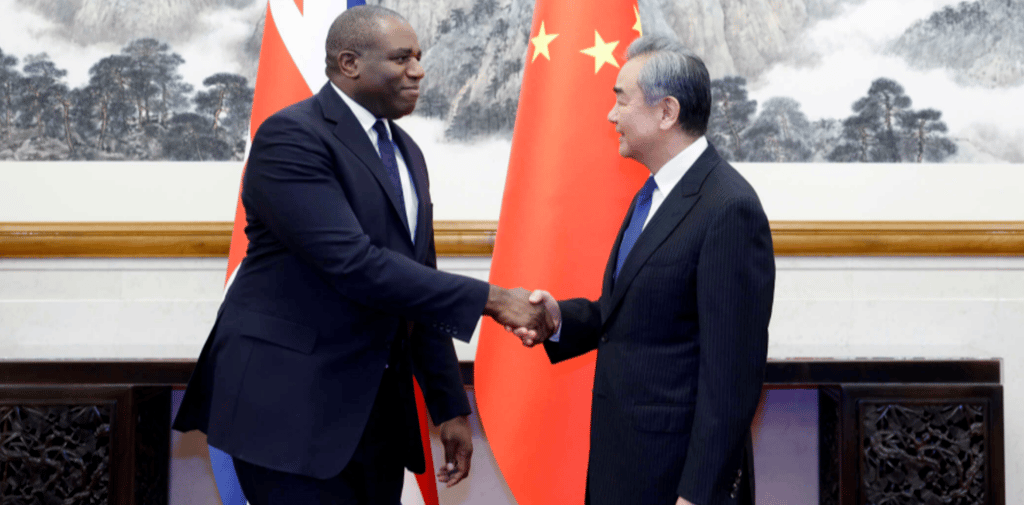China and the UK: Allies in a Trade War Storm?
4/24/20253 min read


China and the UK: Allies in a Trade War Storm?
Introduction: A Diplomatic Dance Amid Global Tensions
On April 22, 2025, a phone call between Chinese Foreign Minister Wang Yi and UK Foreign Secretary David Lammy sparked international buzz. Shared on X by the Chinese Embassy in the US (@ChineseEmbinUS), the conversation revealed China’s push for unity with the UK to counter what Wang called the U.S.’s “indiscriminate” actions. With global trade tensions at a boiling point—think 76% U.S. tariffs on Chinese goods and retaliatory sanctions—this dialogue isn’t just diplomatic chatter. It’s a window into a shifting world order. Let’s unpack what’s at stake and why it matters to you.
The Context: A Trade War Heating Up
The U.S. has been flexing its economic muscle, slapping hefty tariffs on Chinese goods and closing trade loopholes like the “de minimis” rule, which once allowed low-value Chinese packages to flood the U.S. market tariff-free (Reuters, 2025-04-03). President Trump’s latest moves, including a 245% tariff threat on Chinese imports, have sent shockwaves through global supply chains. Countries like Vietnam and Mexico, which rerouted Chinese goods to dodge U.S. sanctions, now face their own tariffs of 24% to 46%. As Jens Eskelund from the European Union Chamber of Commerce in China noted, restructuring these supply chains won’t happen overnight.
China isn’t sitting idly by. From sanctioning U.S. officials over Hong Kong to urging Japan and the EU to resist U.S. “bullying” (The Economic Times, 2025), Beijing is rallying allies. Enter the UK—a permanent UN Security Council member and a key player in global trade. Wang Yi’s call to Lammy wasn’t just a courtesy; it was a strategic pitch to uphold the multilateral trade system and the post-WWII global order.
What Was Said: A Call for Unity
During the call, Wang Yi stressed that China and the UK share a “responsibility” to defend the UN-centered international system against “rampant unilateral bullying”—a not-so-subtle jab at the U.S. He urged both nations to “eliminate distractions” and safeguard global trade. Lammy, in response, acknowledged their joint role in ensuring sustainable development for the global economy, signaling the UK’s willingness to keep communication lines open. They also touched on the Ukrainian crisis, a reminder of the broader geopolitical stakes at play (Global Times, 2025).
Why This Matters: The Bigger Picture
This isn’t just about tariffs or trade routes—it’s about the future of global cooperation. China’s outreach to the UK reflects a broader strategy to counter U.S. dominance by building coalitions with Western powers. For the UK, balancing relations with both the U.S. and China is a tightrope walk, especially post-Brexit as it seeks to assert its global influence. For everyday folks, this could mean higher prices for goods, disrupted supply chains, and even shifts in international alliances that affect global stability.
The Ukrainian crisis angle adds another layer. China’s careful diplomacy—distancing itself from controversial remarks by its own officials while engaging with both Ukraine and Russia—shows its intent to play a mediator role, even as the U.S. and EU watch closely (Wikipedia, 2024-10-14).
What’s Next: A Fragile Partnership?
The China-UK dialogue hints at a potential partnership, but it’s fragile. The UK’s alignment with U.S. policies, like sanctions on China over Hong Kong, could strain this budding cooperation. Meanwhile, China’s own actions—like its sanctions on U.S. officials—keep tensions high. For now, both nations seem committed to keeping the conversation going, but the road ahead is bumpy.
Conclusion: Your Turn to Weigh In
The China-UK phone call is a small but significant piece of a larger puzzle. As global powers jostle for influence, the decisions made today will shape the world we live in tomorrow. What do you think—can China and the UK truly unite to counter U.S. policies, or will their differences pull them apart? How might rising tariffs affect your daily life, from the price of your phone to the availability of your favorite gadgets? And finally, should the UK risk its alliance with the U.S. to forge closer ties with China? Drop your thoughts below—I’d love to hear your take!
Reference:
- The X post references a phone call on April 22, 2025, between Chinese Foreign Minister Wang Yi and UK Foreign Secretary David Lammy, where Wang criticized the U.S. for "indiscriminate" actions, likely alluding to recent U.S. policies like the January 2025 ban on romantic relationships between American government personnel in China and Chinese citizens, which heightened diplomatic tensions (AP News, 2025-04-04).
- Wang Yi emphasized China and the UK's shared responsibility as UN Security Council members to uphold the post-WWII global order and multilateral trade systems, a stance reflecting China's broader push against U.S. unilateralism amid escalating tariffs and sanctions, such as the U.S. threat of 245% tariffs on Chinese goods (Global Times, 2025).
- The call also touched on the Ukrainian crisis, highlighting China’s strategic interest in aligning with Western nations like the UK on global issues, despite strained U.S.-China relations, as evidenced by China's retaliatory sanctions on U.S. officials over Hong Kong (us.china-embassy.gov.cn).
Photo Credit: news.cgtn.com
hello@boncopia.com
+13286036419
© 2025. All rights reserved.